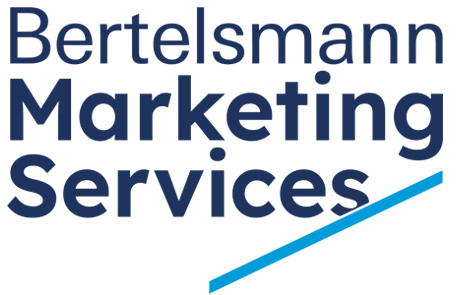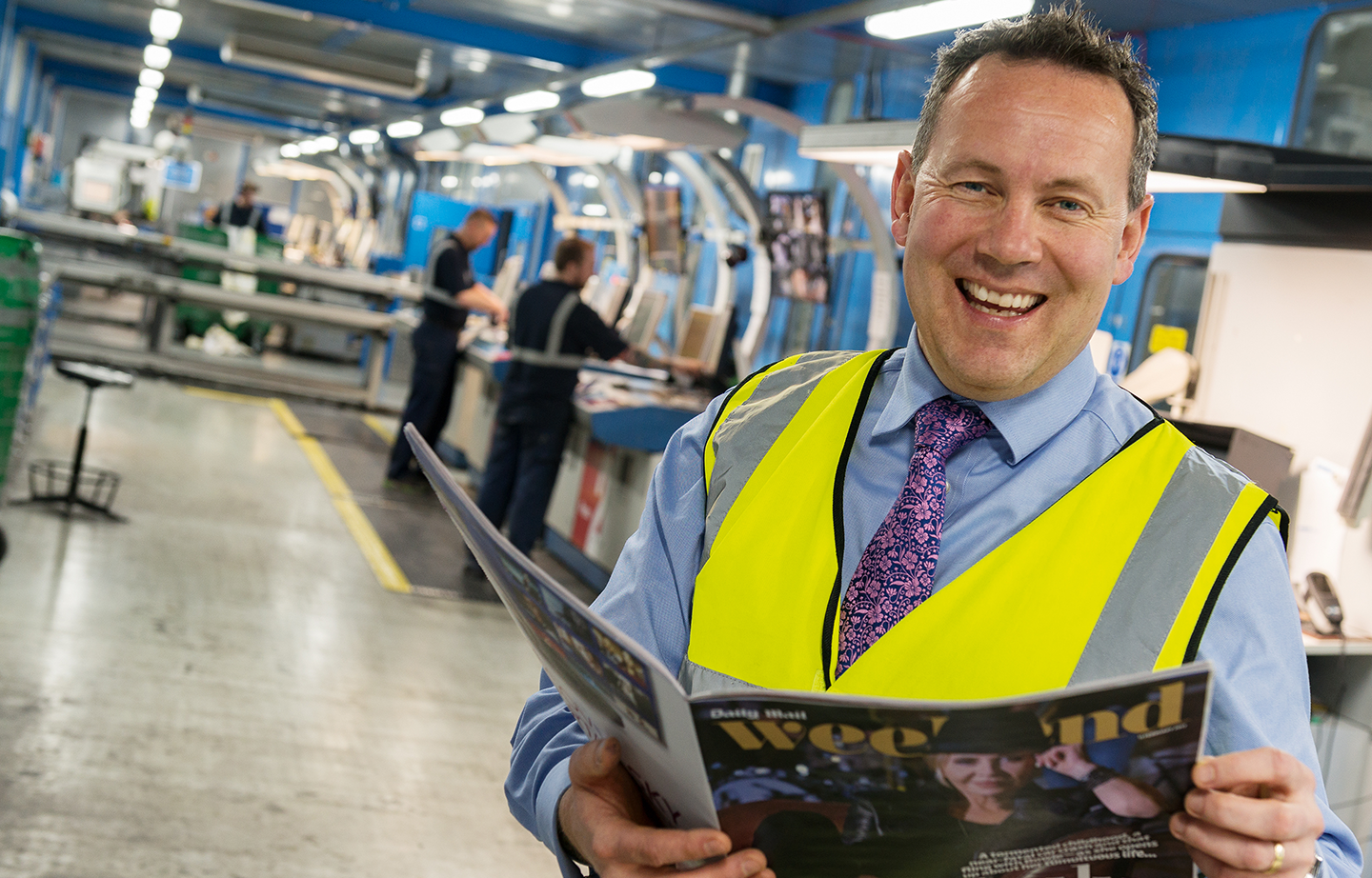The printing press produces a near endless stream of paper, one page after another, precisely folded; 40,000 copies per hour. The dark background and white typeface race by in a blur. The scene would almost be hypnotic save for the incessant clatter of the conveyor belts. Richard Gray takes a quick look at the printed sections rushing past him, before fishing one out and checking it. The Managing Director of Prinovis UK is holding the new edition of “Weekend,” the Saturday supplement of the “Daily Mail.” It is one of five weekend editions that has been printed by Prinovis in Liverpool since April 2016. “We’re very pleased we were able to win these orders,” he says.
Last year, the publishers of the “Daily Mail” and “The Daily Telegraph,” two of the highest-circulation daily newspapers in the United Kingdom, commissioned Prinovis to produce the weekly magazines of their print-edition newspapers. “Saturday Telegraph Magazine” is produced for the Telegraph Media Group, as is “Stella,” which is included in the Sunday edition. “You” and “Event” are produced for DMG Media’s “The Mail on Sunday,” and “Weekend” is included in “Daily Mail” Saturday edition. Together they have a total print run of six million copies per week and some appear with additional inserts. The printing plant in Liverpool produces a weekly volume of around 2.5 million copies of “Weekend” alone. “For our clients in the newspaper industry, the magazine supplements are important because they support sales of their weekend editions. At the same time, they can sell ads in the magazines,” explains Gray.
70 new full-time jobs
In view of decreasing volumes in the printing market, winning these two large and well-known customers can be considered a coup for Prinovis UK. The Liverpool site is therefore well utilized for the foreseeable future, as both contracts have been signed with five-year terms. To be able to fulfill the orders reliably and with the usual quality, the management has created around 70 new full-time jobs. Prinovis UK now employs 491 people. Machines have been relocated, reactivated, or bought new, such as a Ferag Unidrum saddle-stitcher, to combine sections and add inserts into finished products.
“We’ve invested in several areas to be able to cope with the high print runs,” says Gray, leaving Press No. 2 and crossing the production hall on the green-and-yellow safety routes. Several meters above him, conveyor belts carry the “Weekend” supplements, pegged like a clothesline, across people and machines. They snake among pipes, shafts and struts, on the way to the next station in the finishing process. About a year after the start of production in May 2016, Gray draws a very positive interim balance: “We enjoy what we do and, most importantly, the customers are satisfied.”
At the same time, he makes it clear this is not a standard job, not just because of the size of the print runs; but the above-average size of the “Weekend” title also required adjustments in the work flow and equipment. Even as these tasks are completed, the biggest challenge they bring has to be overcome anew every week: “The supplements are very time-critical productions, where we have to meet tight and precise deadlines. Fortunately, there have been no major difficulties to date. But we have to constantly keep renewing our commitment and concentration so that no mistakes occur.”
Volatile print market
Richard Gray has worked in the printing business for almost 30 years. He has run the Liverpool site since 2007. He knows the situation in the industry very well and knows that quality and customer focus are more important than ever before. The printing market in the UK as well as in other European countries is “very volatile,” in other words, subject to constant change. Many products that were once printed are now only published digitally. On the other hand, in certain areas print runs have remained stable or are even increasing: Flyers, catalogs and brochures play a major role for retailers and traders in promoting their products and attracting buyers. JD Williams, for example, one of the UK’s largest mail order companies and one of Prinovis UK’s largest customers, uses print heavily in its marketing mix and prints most of its catalog and direct mail offers in Liverpool. “The market is declining, but print is definitely still very much alive and indispensable in the media mix,” emphasizes Gray.
However, remaining indispensable as a provider of print products requires thoughtful positioning. Since opening the Liverpool site in 2006, Prinovis UK has established itself as a reliable print partner that combines high quality with comprehensive services. As the last active gravure printing company in the UK, Prinovis occupies a strategically valuable position. Although by now many of the orders are for offset printing, which is cheaper for smaller orders, gravure printing remains the first choice for many customers, especially for high print runs, which need to be produced quickly – like daily newspaper supplements. “In the end, it’s not a question of which printing method a customer prefers,” says Gray. “The overall package of price, performance and service is always decisive. And here, gravure puts us ahead in many cases.” Prinovis UK printed 155,000 tons of paper last year – equivalent to the weight of 560 Airbus A380s.
The high-performance plant-list is another decisive factor for rapid, high-quality production. Prinovis has four roto-gravure presses in Liverpool, along with five saddle-stitchers, two adhesive binders, and eight polybagging lines, which wrap a specific number of magazines in clear plastic film at high speed, creating packages that are ideally suited for transporting on pallets. As he walks alongside one of the polybagging machines wrapping the finished and stapled copies of “Weekend,” Richard Gray explains: “We intend to further expand our finishing and inserting capacity during the course of the year, and will be investing here.”
A solid group
The team in Liverpool benefits from support from its sister sites in Germany. In fact, DMG Media and Telegraph Media Group, awarded Prinovis UK the bid partly because the company operates as part of a powerful network. The German Prinovis sites in Dresden, Ahrensburg and Nuremberg take over parts of the production of less time-critical orders for their colleagues in the UK. The resources freed up by this can be devoted entirely to the weekend magazines. “Without this support, we wouldn’t have been able to cope with the new volumes. This is a very big help for us and shows the value-add that the Bertelsmann Printing Group offers all of us,” praises Gray. Bertelsmann’s commitment to the printing business not only helps in the specific case of this order, but also in general: “Our customers know that we are part of a solid group of companies and can offer vast capacity thanks to the international network.” The message of the most famous soccer anthem in the world, which was first sung in Liverpool’s famous Anfield stadium by thousands of passionate fans, is true for Prinovis UK as well: “You’ll never walk alone.”
But to where exactly is Prinovis UK walking? Winning the two major contracts last year coincided with the site’s tenth anniversary. Now the task at hand is to continuously improve the production processes for these orders, to increase profits for Prinovis UK and keep the customers satisfied, explains Gray. “A renewal of the two contracts in five years’ time must, of course, be our goal.”
There is no question for the Managing Director that the Liverpool site will face changes in the medium to long term: “We are already thinking about what our company might look like five or 10 years from now. Perhaps at that point we will be a hybrid site and offer offset as well as gravure printing.” However, Gray is hesitant about making specific predictions. He is familiar with the great challenges and fluctuations of the print market, and says that it will be crucial to keep up the sales push at a high level, to compensate for declining circulation with new orders. In addition, the team is constantly examining all options for optimally adapting to customer requirements.
No matter what tasks Prinovis UK may face in the future, Richard Gray is optimistic about the future. “We have a strong position in the market, based on which we can further expand our business and hopefully win new orders for Bertelsmann Printing Group.” He leaves no doubt about who has played the greatest part in recent successes: “Our employees are the key to our company. We have a really outstanding team at every level and in all departments. Everyone works very hard and tirelessly caters to the customers’ needs. I’m happy that we have such a strong team here in Liverpool – as well as the backing of our colleagues in Germany.”



